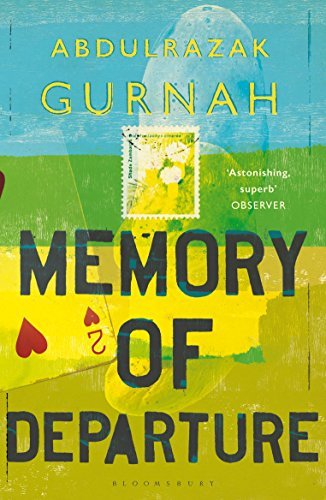What do you think?
Rate this book


160 pages, Kindle Edition
First published January 1, 1987
With our history of the misuse and oppression of Africans by an alliance of Arabs, Indians and Europeans, it was naïve to expect that things would turn out differently. And even where distinctions were no longer visible to the naked eye, remnants of blood were always reflected in the division of the spoils of privilege. As the years passed, we bore with rising desperation the betrayal of the promise of freedom.
His debut novel, Memory of Departure, from 1987, is about a failed uprising and keeps us on the African continent. The gifted young protagonist attempts to disengage from the social blight of the coast, hoping to be taken under the wing of a prosperous uncle in Nairobi. Instead he is humiliated and returned to his broken family, the alcoholic and violent father and a sister forced into prostitution.
We had already learnt not to choose one of ourselves for such tasks, not one of those who had for centuries, and against all visible evidence, persisted in calling themselves Arabs. Independence had taught us enough of the violent hatred that the rest of the country felt for the history that we had been part of. We had strutted our miscegenated way through the centuries, making monkeys out of our half-brothers and half-sisters, while those that we claimed to be part of, where they knew of us, disclaimed and despised us as some bastard offspring of energetic and uncouth sons.
"Ми ж не виганяємо білих. Ми надто їх боїмося. Ми хочемо, щоб вони нас любили. Африканське мистецтво, африканська історія... ми благаємо їх вважати нас людьми"
I never thought I would miss that land. Now I’m afraid that I might forget it all. Drama, more drama! I’m homesick.
That land, this land, Africa.
I suppose you don't have to read a lot of African fiction to guess that much of it is about departure and running away. It is a land that is best departed from, more or less. You either run, or spend your time thinking of running, if you're a character in an African novel, mostly. And who can blame them, poor Characters-in-African-Fiction, who can blame them for wanting to escape? There's little to remain behind for, yet, in retrospection, so much to remember. You only have to look around, if you're in Africa, and you'll see that there can't be much freedom to explore other matters, before the matter of departure has been addressed. African fiction is mostly about departure, for Africa is the great resentful hearth we want to leave behind and join the world of other things, other issues.
At least, that is the case in this novel, and, I imagine, in most if not all the other novels by the same writer, Mr. Abdulrazak Gurnah. And it is a fine novel, for a debut—brief, unpretentious, but of great ambition, and very daring. Never in fiction have I encountered in so few pages so many mentions of anuses and arseholes and penises, without disgusting the senses. It does not disgust or abuse the patience of this cultured reader for it is obvious that the vulgarity is not the objective, but really only an aspect of the world of the novel. Not an anus in excess, here. The novel is of the linear mode, no complications of timelines or in fact any confusions of any kind anywhere. Maybe there is a touch of sentimentality towards the end, all that business with the poor hero and the rich lady, all that business with the rich uncle and all that, but I'd be lying if I said I didn't enjoy those parts very much. For there is nothing more familiar to me than rich uncles and big painted houses among trees, and pretty daughters in the most bewitching outfits, and the softest skins, and the sweetest voices. You can't tell me about how much pretty daughters drive the poorest of lads into the wildest of dreams. No, the whole Salma-Hassan affair was the very best of plots, and though I don't wish it lasted longer, I did not find any of it tedious, and the ambigous ending was very much to my taste, not because I do not wish to know whether the poor kid got the girl in the end—that would be soapy, risky, long-winded— but because I love ambiguous endings, especially of the kind here displayed. It's a novel of departure from childhood, of the very early years of youth, and it seems to me that with the hero's departure for good from his old gutter of a hometown, there's no more childhood left to live, he's a man now, he can move on to other things. The portrait is complete, or sufficient, at the very least.